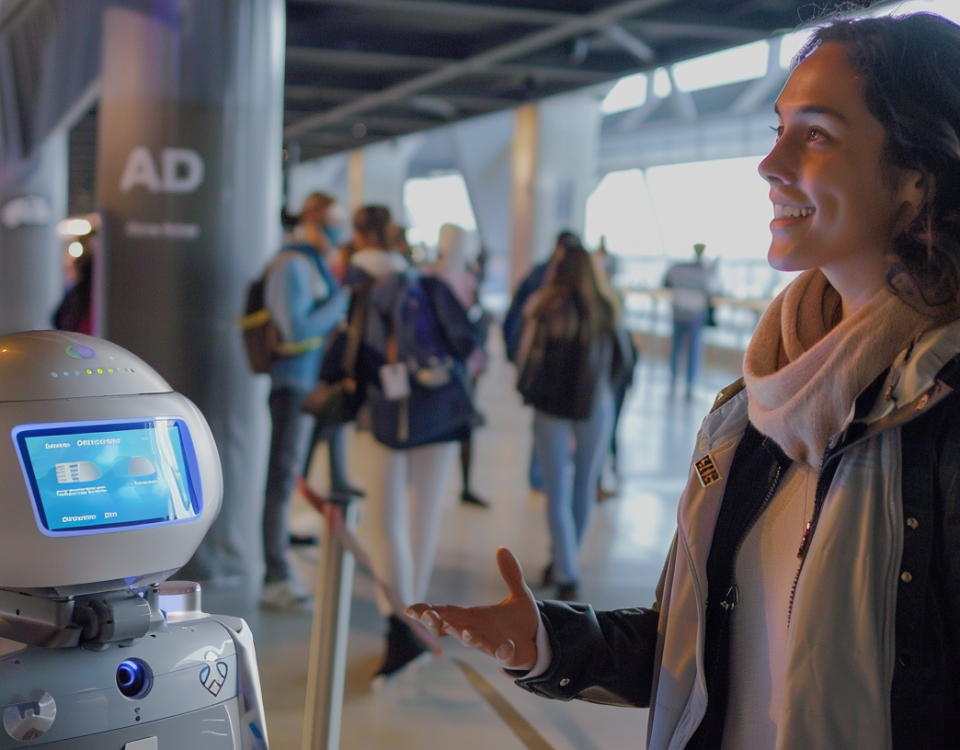
Artificial intelligence and creation summit: where to start?
05/05/2024
The growing use of AI in museums and cultural venues
04/06/2024Imagine a potential traveler planning a vacation in Quebec. He has a question about a hotel or a tourist attraction, and instead of waiting for an answer by e-mail or making a phone call, he immediately gets precise answers via a chatbot. Simply getting a quick answer to his questions will improve his experience, because he’ll be able to continue planning his trip without wasting time.
Although conversational chatbots have been around for several years to answer customer questions, their potential was rather limited and the answers given were not very detailed. The tool was still not very accessible to small businesses. With the emergence of generative AI, the possibilities have exploded, making the integration of a conversational chatbot more capable of answering specific questions, in a much simpler process and becoming high-performance and low-cost for all tourism organizations.
Quebec’s tourism industry attracts millions of visitors every year. To remain competitive and meet the growing expectations of travelers, tourism organizations – from hotels to tourist attractions – need to adopt advanced technological solutions. Conversational chatbots are emerging as essential tools for improving customer experience, automating services and boosting operational efficiency.
Some tourism organizations have already begun to adopt these tools and transform the way they interact with visitors. Conversational agents integrate seamlessly into various aspects of their operations, offering not only fast, accurate responses, but also increased personalization of services.
How does this technology fit into the tourism sector, and what are the concrete benefits for local organizations? Let’s take a closer look at why conversational chatbots can revolutionize the customer experience and optimize operations for tourism businesses.
Why are chatbots essential for tourism organizations?

In a sector as dynamic as tourism, the ability to respond quickly and effectively to customer needs is crucial. Today’s travelers expect immediate answers and ongoing assistance, and this is where conversational chatbots become indispensable. These tools offer instant responses, 24/7 availability and increased personalization of services, enabling companies to stay connected with their customers at all times. Whether answering questions about schedules, reservations or local attractions, chatbots lighten the workload for staff while increasing visitor satisfaction. Here are just a few reasons why this technology is revolutionizing the customer experience and optimizing operations for tourism businesses in Quebec.
1. 24/7 customer service
Chatbots can provide answers and assistance around the clock, even outside business hours. This 24/7 availability enables travelers to get the information they need at any time, enhancing their overall experience. Customers no longer have to wait hours or days for answers to their questions, which increases their satisfaction and loyalty.
2. Cost reduction
Automating customer interactions can significantly reduce customer service costs. Chatbots reduce the need for a large support team, enabling companies to reallocate their human resources to more strategic, value-added tasks. This reduction in operating costs is particularly beneficial for small businesses in the tourism sector.
3. Improved customer experience
Chatbots provide fast, personalized responses, which significantly improve customer satisfaction. By instantly answering their questions and offering recommendations tailored to their needs, chatbots create a smooth, enjoyable user experience. This allows companies to stand out for the quality of their customer service. A chatbot can handle a variety of requests, such as booking spa services, ordering in-room meals or arranging airport transfers. By automating these interactions, hotels can offer fast, efficient service, improving customer satisfaction. Conversational agents are increasingly used in museums in Quebec and elsewhere, enabling visitors to interact with selected works of art. The Musée nationale des beaux-arts du Québec is a case in point.
4. Reservations management
Chatbots are extremely effective for managing reservations and cancellations. They can automate these processes, reducing human error and processing times. Customers can book rooms, tickets or activities directly via conversations with chatbots, simplifying the process and increasing customer satisfaction.
5. Multilingualism
The tourism sector welcomes customers from a wide range of linguistic backgrounds. Chatbots can interact with customers in multiple languages, which is crucial to providing an inclusive and accessible service. This multilingual capability enables companies to better serve international customers and extend their reach into the global marketplace.
6. Customization
Chatbots can offer personalized recommendations based on user preferences and history. By analyzing past interactions and collected data, chatbots can suggest activities, restaurants or services that perfectly match customers’ tastes and needs. This personalization strengthens the relationship between the company and its customers, encouraging them to return.
7. Collecting data
Interactions with chatbots provide valuable data on customer preferences and behaviors. This data can be analyzed to improve services and adapt marketing strategies. By better understanding their customers, companies can personalize their offers and continually improve their services.
8. Accessibility
Chatbots make information and services more accessible to people with special needs, such as the hearing impaired. By offering tailored communication options, chatbots help create an inclusive and welcoming environment for all customers, reinforcing a company’s brand image.
Conclusion: Chatbots, a strategic and sustainable tool for the tourism and cultural industries

Adopting conversational chatbots is no longer just a possibility for tourism organizations in Quebec – it’s an option to be seriously considered. By enhancing the customer experience, automating processes and providing valuable data for personalizing services, chatbots help tourism businesses stay competitive in an increasingly demanding market. What’s more, it’s important to realize that the arrival of the conversational agent in no way detracts from human contact. On the contrary, the chatbot complements the current experience and even allows staff to spend more quality time with our visitors.
For tourism businesses in Quebec, such as hotels and attractions, the integration of this technology represents an opportunity to stand out from the crowd and offer memorable experiences to their visitors. By adopting conversational chatbots, these organizations can not only improve their operational efficiency, but also create richer, more personalized interactions with their customers.
If you’re a tourism organization looking to optimize your services and deliver an exceptional customer experience, consider integrating conversational chatbots into your operations. This technology is not only a current trend, it’s also a strategic investment in your company’s future.
Note: We would like to inform you that artificial intelligence has been used as a tool to help with the content of this article and the creation of images. All published content has been carefully checked, edited and approved by the author of this article to ensure its quality and relevance.





